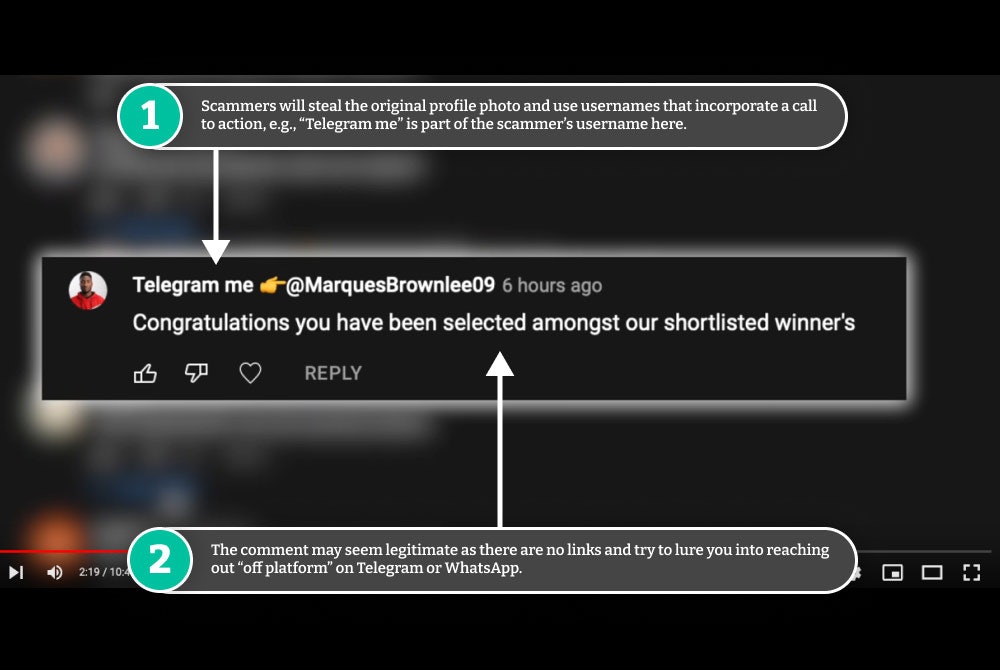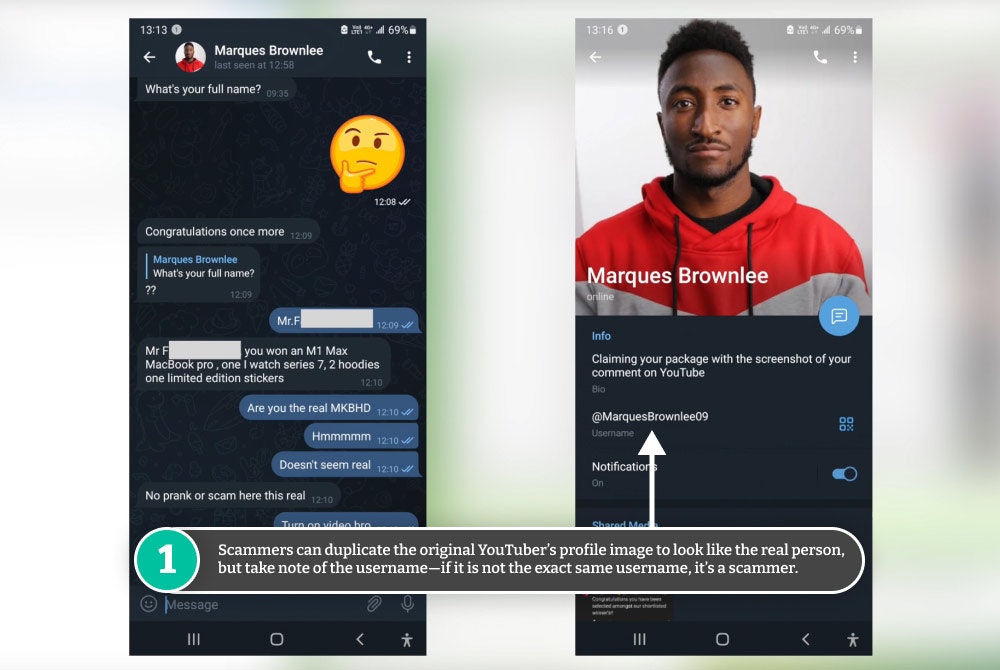- How the YouTube Comment Scam Works
- How to Beat YouTube Comment Scams
- Red Flags to Watch Out For
- Frequently Asked Questions
The rise of many prominent YouTube channels and the large audiences they attract has meant scammers are targeting unsuspecting viewers of their videos in the comment sections. Scammers are getting very clever and targeted in their techniques. They post comments replying to individual people, posing as the original video creator, and lure them into believing they have won a prize or have some special offer available.
Always be wary of initiating contact with a YouTube creator "off platform" (on Telegram or WhatsApp, etc.) or clicking on any links in the YouTube comments section, particularly if they are referring to:
- Special offers on products
- Product giveaways
- Subscriber bonus content
How the YouTube Comment Scam Works
YouTube has become such a massive resource and important source of information that very prominent YouTube creators and their associated channels have attracted huge subscriber numbers. Because the owners of these channels have built strong brands and are generally trustworthy and respected personalities, scammers have learned to leverage that appeal. They are now posing as the original creator in the comments section.
Comment scam techniques are widespread and varied, but a popular technique on YouTube specifically.
How it works is relatively simple.
Scammers Impersonate YouTubers
Scammers create many fake accounts with the same profile picture as the video creator and clever variations on the username. They will then respond to individual comments from viewers offering a giveaway or prize for being a loyal fan.
Example Scammer CommentsThanks for the feedback, Expect more videos very soon. Send a direct message, I have something for you...
Thanks for watching. Message right away I have something for you
Congratulations you have been selected amongst our shortlisted winners
The seemingly innocuous comments that don't contain any links lure victims in. The scammers will usually incorporate an action into their username like "Telegram me @MarquesBrownlee09." (The @username chosen by the scammers will often be very close to the original video creator's username to trick the reader.)

The Scammer Tries to Contact You Outside of YouTube
The scam works by getting you "off platform" and onto other services like Telegram or WhatsApp. Here they will direct message you and say you have won a prize or are being given some sort of special offer.
You may feel flattered and excited thinking you are communicating directly with the popular YouTuber, but you are, in fact, now messaging directly with the scammer.
You're Asked to Send Money or Click On a Link
The scammer will then ask for money for delivery of the "free" item or send your links that may be malicious or open you up to further malware or scams.
Always Verify the YouTube Username
If you are ever contacting anyone directly via a platform like Telegram or WhatsApp, be sure to verify the exact username of the person. If they don't match, you are likely speaking with a scammer.

How to Beat YouTube Comment Scams
YouTube itself is trying to fix the problem by providing buttons beneath comments to "report" or "flag" a message as spam, and you can do that when you believe the comment is indeed spam. YouTube has its hands full, though, as you can imagine, in keeping up with the millions of scam accounts created every day.
YouTuber Marques Brownlee has created a video (below) about the extent of the problem in detail and gives examples of how the scam can play out.
The way to beat this scam is to be very suspicious of any links or comments requesting you to make a connection, particularly taking the conversation outside the YouTube platform onto apps like Telegram or WhatsApp.
The most important thing is don't send them any money. If you have only messaged a scammer and provided no other details, you should delete the conversation and/or block and report the user in that app.
More information about what defines recognized scams on YouTube and their mechanism for reporting scams are available at YouTube Help.
Red Flags to Watch Out For
Typically scammers will try to entice viewers by responding to individual comments rather than open comments to all. This means viewers are often excited to receive a reply at all—and when it looks like it's from your favorite YouTuber, it is extra appealing.
Things to look out for within the comments that could point to a scam include:
- Praise for your comment and a request for you to contact them on Telegram or WhatsApp
- Mentions of special previews of products
- Product giveaways
- Bad grammar and liberal use of emoticons
- Requests to pay for the delivery of special "free" offers


Comments